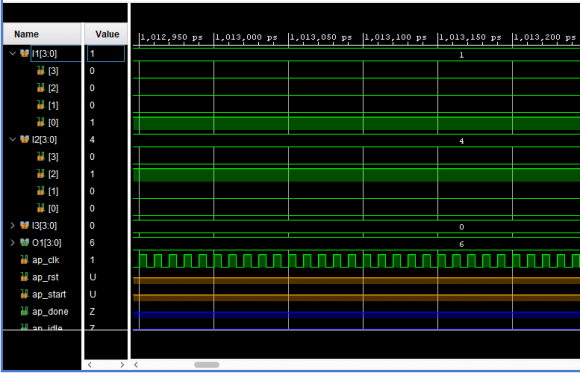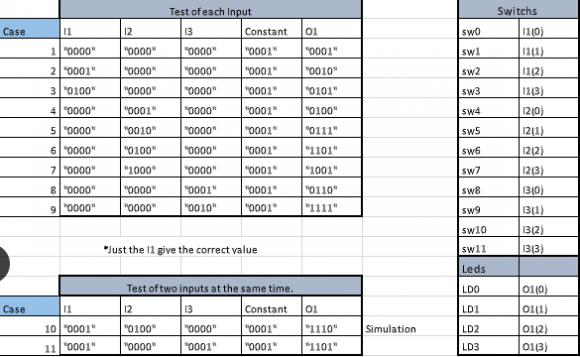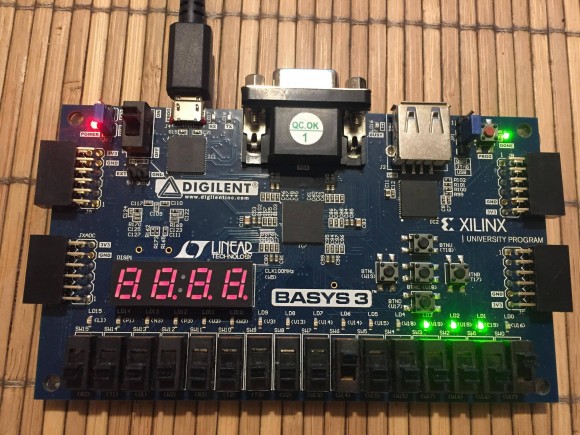Reusing registers in VHDL FSM code
Hello,
I need to write a Finite State Machine (FSM) in VHDL code and want to have several computations being processed at the same time (a standard pipeline). In every state I have several operations to be calculated and I employ registers for the result of each one. I strongly need to reuse these registers, for example: Register 1 is filled in State 1 (as a result of a multiplication) and it is used in the State 2 and State 3 (as parameter of other operations), then in the State 4, I want to save a new operation result (another multiplication) in Register 1 reusing it.
My code works in Simulation in Xilinx Vivado 2019, but when I implement the desing in a real FPGA (Basys 3 Artix-7) it doesn't work. I realized that the problem is that the correct values are not saved when I reuse the registers. Sometimes, the first time I reuse them, they keep the correct value, but already in the second reuse in later FSM states, the stored values are not correct, I mean, they do not correspond to the result of the operation that I am trying to save in the register.
Next, an example of my FSM design:
LIBRARY IEEE;
USE IEEE.std_logic_1164.all;
USE IEEE.numeric_std.ALL;
ENTITY test1_arith IS
GENERIC (
ap_bit_width : positive := 4;
ap_latency : positive := 2
);
PORT (
I1 : IN STD_LOGIC_VECTOR(ap_bit_width - 1 downto 0);
I2 : IN STD_LOGIC_VECTOR(ap_bit_width - 1 downto 0);
I3 : IN STD_LOGIC_VECTOR(ap_bit_width - 1 downto 0);
O1 : OUT STD_LOGIC_VECTOR(ap_bit_width - 1 downto 0);
ap_clk : IN STD_LOGIC;
ap_rst : IN STD_LOGIC;
ap_start : IN STD_LOGIC;
ap_done : OUT STD_LOGIC;
ap_idle : OUT STD_LOGIC;
ap_ready : OUT STD_LOGIC
);
END;
ARCHITECTURE test1_arith_arch OF test1_arith IS
ATTRIBUTE CORE_GENERATION_INFO : STRING;
ATTRIBUTE CORE_GENERATION_INFO OF test1_arith_arch : ARCHITECTURE IS "Test,VHDLbyMOEA,{HLS_SYN_LAT=2}";
CONSTANT ap_const_logic_1 : STD_LOGIC := '1';
CONSTANT ap_const_logic_0 : STD_LOGIC := '0';
TYPE state IS (state_1,state_2,state_3);
SIGNAL state_present: state;
SIGNAL state_future: state;
SIGNAL Flag: Integer:=0;
--Signal RF : STD_LOGIC_VECTOR_array;
FUNCTION ALU ( Op: IN integer range 0 TO 23;
A, B: IN STD_LOGIC_VECTOR (ap_bit_width - 1 downto 0) )
RETURN std_logic_vector is variable Result : std_logic_vector(ap_bit_width - 1 downto 0);
variable A_int: Integer:=0;
variable B_int: Integer:=0;
variable Result_int: Integer:=0;
begin
A_int := to_integer(unsigned(A));
B_int := to_integer(unsigned(B));
With Op Select Result_int:=
to_integer(unsigned(NOT A)) When 0,
to_integer(unsigned(A AND B)) When 1,
to_integer(unsigned(A OR B)) When 2,
to_integer(unsigned(A NAND B)) When 3,
to_integer(unsigned(A NOR B)) When 4,
to_integer(unsigned(A XOR B)) When 5,
to_integer(unsigned(A XNOR B)) When 6,
(A_int + B_int) When 7,
(A_int - B_int) When 8,
(A_int * B_int) When 9,
(A_int / B_int) When 10,
ABS(A_int) When 11,
(A_int ** B_int) When 12,
(A_int MOD B_int) When 13,
to_integer(unsigned(A) & unsigned(B)) When 14,
to_integer(unsigned(A) SLL B_int) When 15,
to_integer(unsigned(A) SRL B_int) When 16,
to_integer(unsigned(A) SLA B_int) When 17,
to_integer(unsigned(A) SRA B_int) When 18,
to_integer(unsigned(A) ROL B_int) When 19,
to_integer(unsigned(A) ROR B_int) When 20,
to_integer(unsigned(A) & unsigned(B)) When 21,
to_integer(unsigned(A) & unsigned(B)) When 22,
0 When others;
return STD_LOGIC_VECTOR (TO_UNSIGNED (Result_int, (ap_bit_width)));
END FUNCTION;
SHARED VARIABLE R1:std_logic_vector(ap_bit_width - 1 downto 0);
BEGIN
OP_FSM : PROCESS (state_present)
BEGIN
CASE state_present IS
WHEN state_1=>
R1 := ALU(Op => 7 ,A => I1,B => I2);
Flag<=1;
IF (Flag=1) THEN
state_future <= state_2;
END IF;
WHEN state_2=>
R1:= ALU(Op => 7 ,A => R1, B => I3);
Flag<=2;
IF (Flag=2) THEN
state_future <= state_3;
END IF;
WHEN state_3=>
O1<= ALU(Op => 7 ,A => R1,B => "0001");
Flag<=3;
IF (Flag=3) THEN
state_future <= state_1;
END IF;
END CASE;
END PROCESS OP_FSM;
CLK_FSM : PROCESS (ap_clk)
BEGIN
IF (ap_clk = '1' AND ap_clk'EVENT) THEN
state_present <= state_future;
END IF;
END PROCESS CLK_FSM;
END test1_arith_arch;
In this case, I want to reuse R1 and it works well in Simulation with Xilinx Vivado (1 + 4 + 0 + 1 = 6):

Unfortunately, in the Basys 3 FPGA Artix-7 I don't get the correct results:

In this figure, I show the Case 10 in a FPGA, it should get 6 (1 + 4 + 0 + 1) as result, but it gets 14 instead:

In the tests that I have been doing I realized that it works better when before assigning a new value in the registry the value of the record is made zero before reassigning a value, for example:
WHEN state_3=>
R4<="0000"
IF( R4 = "0000") then
R4<= ALU(Op => 7 ,A=> R2,B=> R3, C =>"0000");
Flag <=3;
IF (Flag =3) THEN
state_future <= state_4;
END IF;
END IF;
Using this form I can reuse a register once, the second time I want to reassign a value to the register, incorrect values are shown in the output.
I declarated the registers as SHARED VARIABLE and SIGNALS and I have the same problem with both.
I appreciate any suggestion or idea, thanks a lot.

Now I see your flag signal is not in clocked process so my first post needs correction but I see you have combinatorial feedback on R1
Thank you so much. How can I fix my FSM to achieve that it works in the FPGA device?

I suggest you use one clocked process for FSM or you might as well just use a counter instead of explicit state machine. include all assignment in the clocked process and do not use the flag for transition.
To change state after the ALU operation you donot need flag. You could just change state and still assign flag so you know which operations completed. Also you could separate state assignment and state output logic into 2 combo blocks, and separately register outputs in a clocked process, it would be easier to debug. Reassigning registers should be fine.



















